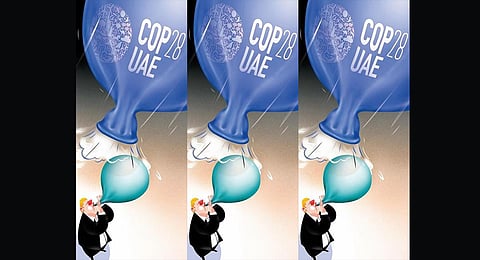

When Dubai is chosen as the venue for the United Nations Climate Change Conference, or Conference of the Parties commonly referred to as Cop28, it rings alarm bells. Is Dubai the right place to plan a reduction in global warming? Or, how to ease out fossil fuels?
The Emirate, as part of the United Arab Emirates, is almost entirely built on fossil fuel wealth.
The UAE is the world’s seventh-biggest oil producer and has the 5thlargest gas reserves. Flaring of surplus gas, which is choking hundreds and is a practice banned 20 years ago, is widely prevalent all over UAE and Saudi Arabia.
It gets worse. The president of the conference is Sultan Al Jaber, UAE’s minister for advanced technology, and he is tasked with reducing climate change on the planet. The only difficulty is he is also the chief of the country’s national oil company, Adnoc.
It has also emerged now, based on leaked documents obtained by the Centre for Climate Reporting (CCR), that the UAE planned to use preparatory climate meetings with various countries to promote deals for its national oil and gas companies.
The documents were prepared by the UAE’s COP28 team for meetings with as many as 27 foreign governments ahead of the COP28 summit and included “talking points”, such as one for China which says Adnoc is “willing to jointly evaluate international LNG [liquefied natural gas] opportunities” in Mozambique, Canada and Australia.
UAE’s COP28 representatives have not denied using the climate conference to further the country’s business dealings. The briefings show the UAE also prepared “talking points” on possible deals for its state renewable energy company, Masdar, ahead of meetings with 20 countries.
Finally, a ‘damages fund’
Al Jaber, on the other hand, insists he is all there. “Climate change is the common enemy, we must unite to fight it,” he says. The run-up to Cop28 has been roiled in controversy but it has been a smooth affair since it started. The first day in Dubai saw the conference approve the fractious ‘Loss and Damages’ or ‘Disaster’ Fund which has been on the agenda for the last few years. Some of the richer nations were quick to make their pledges. Hosts UAE was the first with $100 million, the European Union came in later with $245 million. The fund has collected $475 million so far.
It had been an uphill task. The ‘Loss and Damages’ Fund as a cess on the rich nations to mitigate climate disaster was first raised by Barbados Prime Minister Mia Mottley in Glasgow (Cop26). She rightly argued that the destruction of the environment by capitalist development in the advanced countries – the Industrial Revolution – began global warming, and therefore it should be the rich nations who pay for cleaning up the mess.
What has been pledged so far is peanuts though considering the cost of environmental disasters. In 2020, it is estimated the loss due to climate and other natural calamities exceeded $220 billion. In the case of Pakistan’s floods last year, the World Bank estimated rehabilitation work would cost $16.3 billion. More than 33 million people were displaced and over 1,700 died. What is important though at this stage is that the poorer nations have been able to push through the principle of ‘the polluter pays’. They have a foot in the door, and over time the ‘Disaster Fund’ will grow.
Planned disinformation
Meanwhile, phasing out fossil fuels seems to be off the agenda in the short term. At the recently held G20 summit in New Delhi, Saudi Arabia led a move to block any resolution by the group to reduce fossil fuel use. On paper, Saudi Arabia has committed it will source 50% of its energy from renewable sources by 2030. In practice, the Saudis, as the world’s second-largest oil producer, seem to be moving in another direction.
India is in the same boat. Foreign Secretary Vinay Kwatra, in a press meeting before the Prime Minister departed for Dubai, frankly admitted there was little scope for India to reduce its coal consumption. Coal-fired plants account for 75% of the country’s power generation.
But beyond the pious platitudes these conferences generate, the bigger danger is the new frontier of organized disinformation. A report by Climate Action Against Disinformation, an international coalition of more than 50 environmental advocacy groups, points to the systematic falsehoods being peddled: Humans are not responsible for climate change; recent wildfires were caused by arson rather than hotter and drier conditions; the world is cooling; and oil and gas giants are moving toward carbon neutrality.
Much of this propaganda could have been dismissed had it not been for the state support it garners from countries like Russia and China. This will not only dilute the urgency of reversing climate change but also make it difficult to define targets.
The truth is temperatures in July this year were the highest in 120,000 years. New Yorkers choked on smoke from Canadian wildfires, workers suffered heatstroke in India, glaciers are receding and ice formation in the Antarctic is becoming more difficult. Global warming is real, but we continue to hurtle in the opposite direction. Dubai can hardly be a turning point.